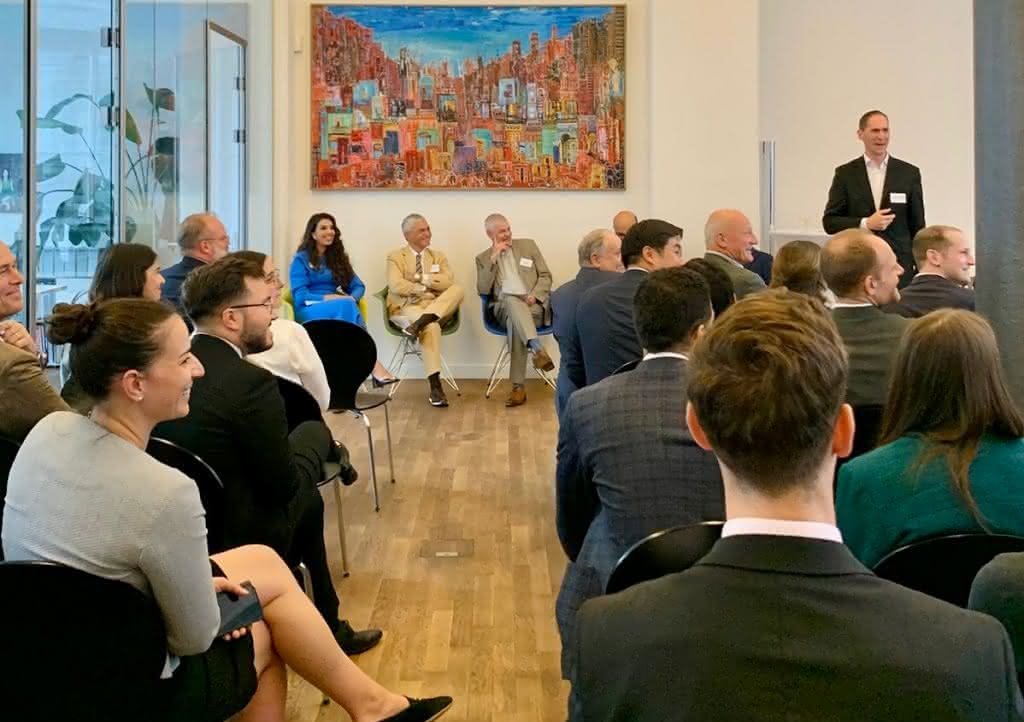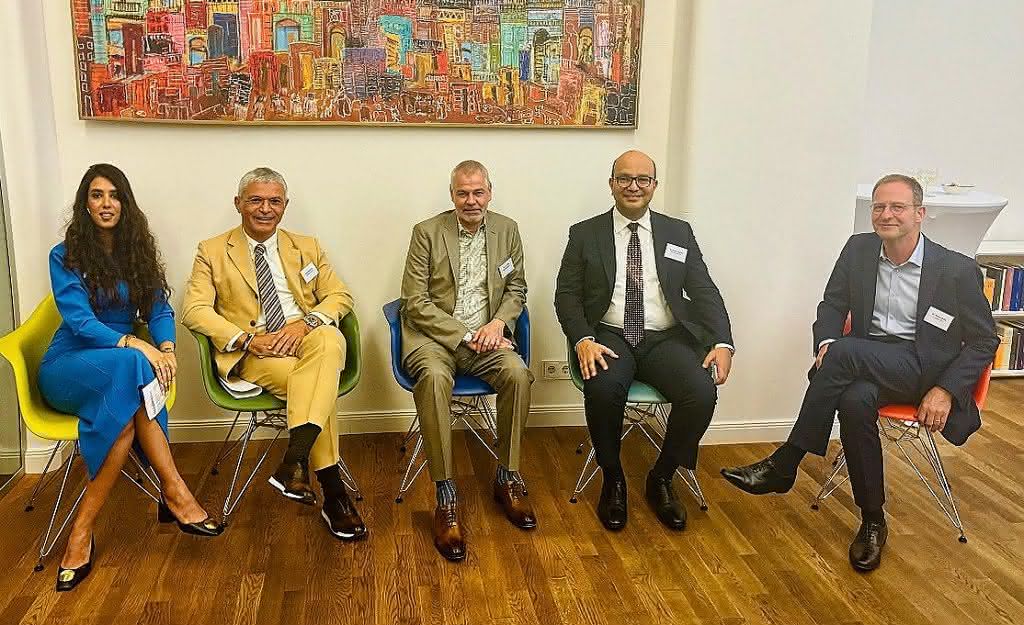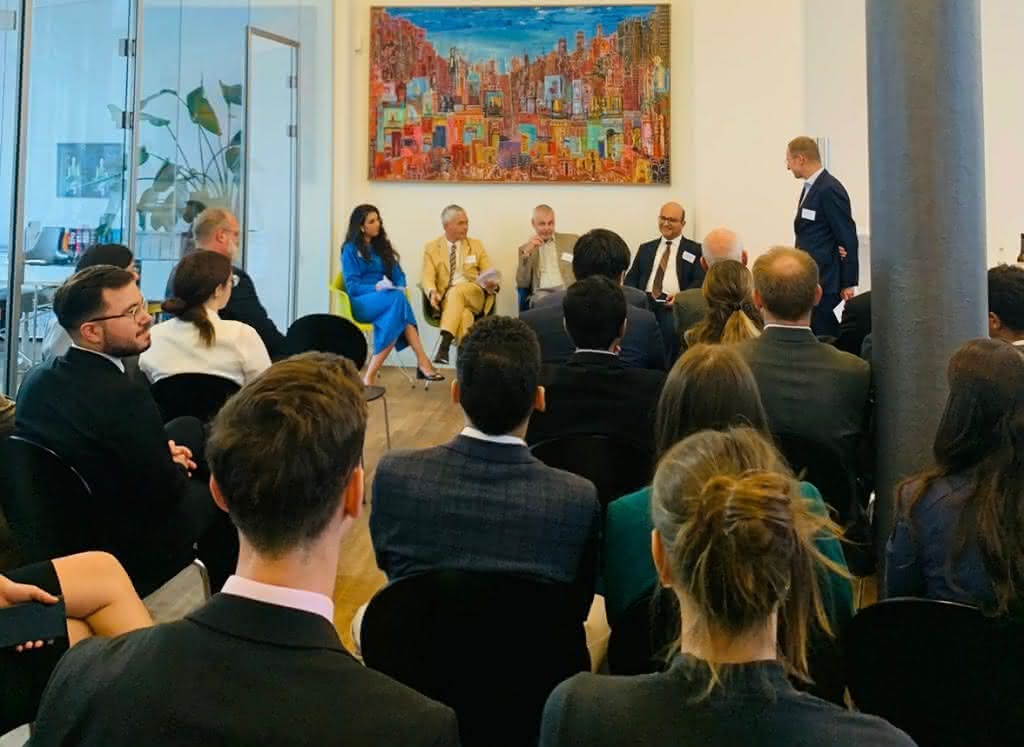
Bridging Arbitration Practices: Strengthening Connections between DIS and North Africa, an event organized by the CRCICA/DIS Arbitration Group in Co-operation with IFRIQYA Arbitration Forum within the framework of the BDRD on 11 September 2024
How can German arbitration practitioners enhance co-operation with North Africa, a region that is of increasing importance for German enterprises and also hosts a vibrant and dynamic arbitration community?
On 11 September 2024, the CRCICA/DIS Arbitration Group in Co-operation with IFRIQYA Arbitration Forum, convened a discussion under the title “Bridging Arbitration Practices: Strengthening Connections between DIS and North Africa”. The panelists included Ismail Selim, Director at CRCICA, Sami Houerbi, Principal at Houerbi Law Firm and President at IFRIQYA Arbitration Forum, Joachim A. Kuckenburg, Partner at K+, Meriem Rezgui, Senior Associate at Amereller Rechtsanwälte, and was moderated by Kilian Bälz, Partner at Amereller Rechtsanwälte. The event was hosted by Amereller Rechtsanwälte as part of the Berlin Dispute Resolution Days with the idea to promote exchange between German and North African arbitration practitioners.

The event kicked off with Reinmar Wolff, welcoming the attendees on behalf of DIS, and Kilian Bälz, welcoming the attendees on behalf of Amereller Rechtsanwälte and introducing the panelists. The panel discussion then started with a discussion on the institutions and forums on the ground in North Africa. Ismail Selim introduced CRCICA (the Cairo Regional Center for International Commercial Arbitration), and highlighted its many advantages, including the newly updated 2024 Arbitration Rules that reflect international standards, the availability of the Rules in three languages (Arabic, English, French), the trilingual, competent case management team, and the cost-effectiveness of the Centre in comparison to other arbitration institutions. Answering an attendee’s question, Ismail Selim assured CRCICA’s independence and neutrality, and illustrated through CRCICA’s establishment, history, and many awards rendered against the Egyptian State that foreign investors should in fact not be concerned. Sami Houerbi introduced IFRIQYA Arbitration Forum, and presented the Forum’s mission, namely promoting arbitration and ADR in North Africa, giving exposure to North African arbitration practitioners both regionally and internationally, promoting diversity, equity, and inclusion among North African practitioners, empowering women, involving the youth in arbitration activities, and bridging the communication gap between different arbitration and ADR stakeholders. Sami Houerbi also spoke about IFRIQYA’s online platform and encouraged the attendees to register and join. The panelists agreed on the importance of exposure of North African arbitration practitioners for all parties, as it is often more effective and beneficial to have an internationally minded North African arbitrator who is familiar with the legal and regulatory framework and the practicalities on the ground will decide over a relevant dispute, rather than a foreign arbitrator who is unfamiliar with the way how things work in the region.
The discussion shifted to the impact of culture and language on the region. Meriem Rezgui highlighted that even though the Francophone countries in North Africa (Tunisia, Algeria, Morocco) are influenced by the French culture and language, also with regard to their tendency to turn to French arbitration institutions, the younger generation is more internationally minded and willing to try out different institutions and explore opportunities with English-speaking cooperation partners. The DIS especially has a good chance in the North African market, given the positive connotations connected with Germany such as excellent quality, efficiency, and professionalism. Joachim A. Kuckenburg expanded further on the cooperation opportunities and emphasized that the arbitration laws in North Africa do not differ greatly from other arbitration laws, for example, the German arbitration law. One main point is for instance that in many Francophone Northern African jurisdictions, an award can be enforced even if it has been annulled at the seat of the arbitration. This again reflects the impact of the French legal system and laws. The similar legal landscapes further prove the panelists’ main point, namely that there is room for more collaboration in the arbitration sector between Germany and North Africa, as there are a lot of unexplored opportunities. The arbitration institutions, particularly DIS and CRCICA, play a vital role in promoting and contributing to the development of arbitration in the region, also under their respective rules.
The panel discussion ended with a clear appeal to arbitration institutions, legal professionals, companies and corporations, and other individuals interested in arbitration in North Africa: Go there! Cross-border conversations and connections are key to bridging arbitration practices and strengthening ties between Germany and North Africa.
The inspiring panel discussion was followed by networking over North African food to match the occasion, during which the panelists and attendees engaged in meaningful discussions, forged new, and fostered existing professional relationships.
All in all, it was an enjoyable event that drew attention to the unexplored opportunities in arbitration in North Africa and encouraged the attendees to expand their horizon.
Farah Fawzy

